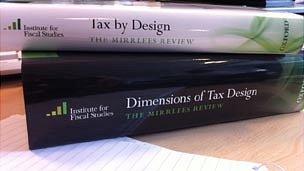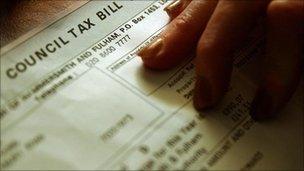Fuel duty should be replaced, says IFS tax review
- Published
- comments

The Mirrlees Review was conducted over five years and produced two volumes
Replacement of fuel duty with a congestion charge is among a number of measures suggested in a blueprint for the tax system by a leading think tank.
The Mirrlees Review, by the Institute for Fiscal Studies, claimed that the UK tax system was inefficient and complex.
In a blueprint for long-term reform, it said an overhaul of the system would benefit the economy by tens of billions of pounds and create thousands of jobs.
Ideas included abolishing property stamp duty and expanding VAT.
"[The tax system] could raise as much revenue and achieve as much redistribution as it currently does in far less costly ways," said Nobel Prize-winning economist Sir James Mirrlees, who led the review.
"There is no getting away from the political difficulty associated with some of the proposed changes. But there is also no getting away from the enduring costs of failure to reform."
A spokeswoman for the Treasury said: "The government has embarked on a programme of ambitious reforms of the tax system to address the instability of recent years.
"These are based on clear principles to support growth, reward work, reduce complexity and increase fairness."
Direction
The review, which took five years to complete, said in its final report that the government took about £4 in every £10 earned in the economy in taxation.
But the authors claimed that, despite the huge sums involved, there was no clear direction for tax policy.

Council tax is "unnecessarily regressive", the review suggests
They suggested that taxation of housing was a "mess", income tax and National Insurance were pointlessly separate, and environmental taxes were "arbitrary and inconsistent".
One of the most striking - and shorter term - recommendations was to bring in a comprehensive system of congestion charging to replace duty on petrol and diesel.
It said that greater fuel efficiency and the advance of electric cars would reduce the income for the government anyway from this form of taxation.
Other recommendations included:
Linking council tax to up-to-date values of homes, rather than a 1991 valuation, and abolishing stamp duty
Merging income tax and National Insurance. Confusion of the system was clear when many basic rate taxpayers paid more in National Insurance contributions than income tax
Extending VAT to nearly all spending. The current system sees means consumers are not charged VAT on items such as food and children's clothing
Making all savings tax free if they do not involve any risk, to avoid saving being discouraged by the tax system
Changing corporation tax in order for businesses to avoid an excess reliance on debt
One additional recommendation that could be made a priority, according to the review's authors, was changing the tax system to provide more incentives for 55 to 70-year-olds and parents of school age children to go to work.
The IFS's director Paul Johnson outlines possible reforms to make the tax system fairer and more efficient
For example, this could include making child tax credits more generous for families whose youngest child was under five, but less generous after they reached five years old.
For the older generation, one idea would be to reduce the age at which a more generous tax-free personal allowance was available from 65 to 55, but to raise the eligibility age for Pension Credit to 70.
The review said that such changes could put 200,000 more people in work and increase total earnings by nearly £3bn.
'Tyranny'
The review did not comment on the fairness of the system, or the level at which tax was levied, but on the way the UK system operated.
Paul Johnson, director of the Institute for Fiscal Studies, said that the "tyranny of the status quo" meant that there would always be some losers if a tax system was altered.
But he argued that failure to come up with long-term changes was costing the country.
"Successive governments have failed to set out a coherent strategy for tax. As a result the current set of taxes is complex and often incoherent and they impose a much greater cost on the economy than need be," he said.
He accepted that many of the recommended changes would be difficult politically, and he said the blueprint was aimed at providing direction for the tax system over the next 10 to 20 years.
Regarding current debate about the 50p top rate of income tax, he said it was difficult to tell at present whether this was bringing in more income for the government.
Reacting to the Mirrlees Review, Francesca Lagerberg, from Grant Thornton, said: "If you were starting today, without any of the baggage from the patchwork quilt of the tax system, a lot of what they are saying is very sensible.
"The problem is we are not starting with a clean sheet. To get these issues agreed by politicians and implemented is a massive change that could take a long, long time.
"In the current economic climate, I expect the political will to engage in this level of radicalism is not quite there."
The Treasury said that it would need to look carefully at any costing of tax reforms, which had not been addressed in the Mirrlees Review.
It added that some of the reforms suggested in the review were already in the pipeline, such as simplification of the benefits system and integrating the operation of National Insurance and income tax.
It had also formed the Office of Tax Simplification, and was reforming the state pension.
Meanwhile, proposals would be published in the autumn that would make the personal tax system more transparent.